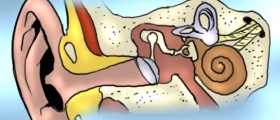
Causes
Motion is registered by our brains. We sense motion through three different channels - our inner ear, eyes and deep tissues known as proprioceptors. When undergoing deliberate movement, all three channels are coordinated, however, when an unexpected or unintentional movement of the body occurs, this can lead to a mixing of the signals received from the channels. It is this lack of co-ordination that is thought to cause motion sickness. For example, if we are sitting and viewing images of a moving car, our eyes will register movement while the inner ear will not. Some might suffer from motion sickness if this scenario occurs.
Some of the input is more important with regard to motion sickness. For example, motion sickness generally does not occur if there is no input from the inner ear channel. It seems that the inner ear has a major influence in the onset of motion sickness. Similarly, as blind people can experience motion sickness, it seems that visual input is not as critical when it comes to motion sickness. Neurotransmitters - substances within the brain and nervous system - seem to be involved in the onset of the problem. Most drugs used to combat motion sickness try to balance the level of the transmitters.
It is more common for motion sickness to be experienced when one is exposed to certain types of movement. For example, you will be more susceptible to motion sickness if the movement is slow, or involves different directional movements.Balance
Essentially, if we lose our balance or equilibrium, we will be more susceptible to the onset of motion sickness. The different channels through which our brain registers movement perform Differing functions. Our ears measure the direction of movement - side to side, up or down, etc. - while the eyes are responsible for spatial orientation and direction. Skin receptors sense our interaction with the ground, while similar receptors in our muscles and joints detect body movement. All of these signals are interpreted and processed by the central nervous system.
Symptoms
If you suffer from motion sickness, you might experience dizziness, nausea, vomiting, sweating, physical discomfort and general malaise. Many suffer from these problems whilst at sea, or when flying or sitting in a moving car. It is important to note that motion sickness and sea sickness are the same disorders.

















Your thoughts on this
Loading...